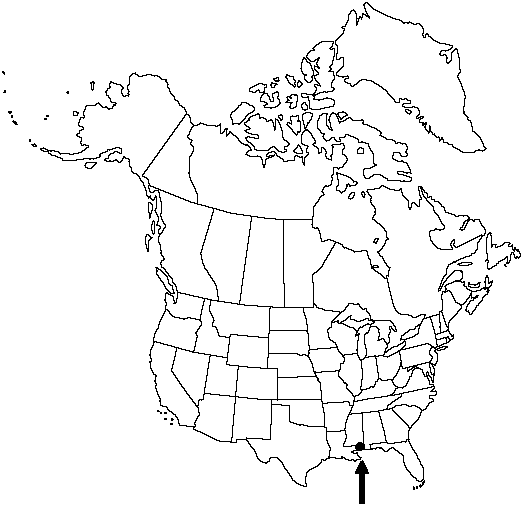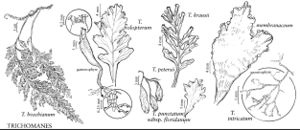Difference between revisions of "Trichomanes membranaceum"
Sp. Pl. 2: 1097. 1753.
FNA>Volume Importer |
imported>Volume Importer |
||
| (7 intermediate revisions by 2 users not shown) | |||
| Line 8: | Line 8: | ||
}} | }} | ||
|common_names=Scale-edged bristle fern | |common_names=Scale-edged bristle fern | ||
| + | |special_status={{Treatment/ID/Special_status | ||
| + | |code=F | ||
| + | |label=Illustrated | ||
| + | }} | ||
|basionyms= | |basionyms= | ||
|synonyms={{Treatment/ID/Synonym | |synonyms={{Treatment/ID/Synonym | ||
|name=Lecanium membranaceum | |name=Lecanium membranaceum | ||
|authority=(Linnaeus) C. Presl | |authority=(Linnaeus) C. Presl | ||
| + | |rank=species | ||
}} | }} | ||
|hierarchy=Hymenophyllaceae;Trichomanes;Trichomanes membranaceum | |hierarchy=Hymenophyllaceae;Trichomanes;Trichomanes membranaceum | ||
| Line 20: | Line 25: | ||
}}<!-- | }}<!-- | ||
| − | --><span class="statement" id="st- | + | --><span class="statement" id="st-undefined" data-properties=""><b>Plants </b>epiphytic, on rock, or terrestrial. <b>Stems</b> long-creeping, threadlike, bearing scattered leaves, covered with dark hairs of 2 types, multicellular gland-tipped hairs and elongate rhizoidlike hairs. <b>Leaves</b> subsessile, irregularly ovate to oblong and often irregularly cleft, 2.5–6.5 × 1–3 cm, bearing multicellular gland-tipped hairs and elongate rhizoidlike hairs on petiole; margin fringed with minute, paired, roundish scales. <b>Blades</b> 2 cell layers thick between veins. <b>Venation</b> flabellate with many unconnected false veins. <b>Soral</b> involucres 5–15 per leaf, marginal on leaf apices, narrowly conic with flaring lips. <b>Gametophytes</b> unknown. <b>2n</b> = 68.</span><!-- |
-->{{Treatment/Body | -->{{Treatment/Body | ||
| Line 26: | Line 31: | ||
|elevation=below 10 m | |elevation=below 10 m | ||
|distribution=Miss.;epiphytic and on rock;Mexico;West Indies;Central America;South America. | |distribution=Miss.;epiphytic and on rock;Mexico;West Indies;Central America;South America. | ||
| − | |discussion=<p>Trichomanes membranaceum resembles species of subg. Didymoglossum in its growth form and chromosome number, and it has been considered by some authors to be of that subgenus. Its marginal scales, absence of stellate hairs, and leaf blades 2 cell layers thick set it apart from other species of subg. Didymoglossum and all other American Trichomanes.</p><!-- | + | |discussion=<p><i>Trichomanes membranaceum</i> resembles species of subg. Didymoglossum in its growth form and chromosome number, and it has been considered by some authors to be of that subgenus. Its marginal scales, absence of stellate hairs, and leaf blades 2 cell layers thick set it apart from other species of subg. Didymoglossum and all other American <i>Trichomanes</i>.</p><!-- |
| − | --><p>The single population reported from Harrison County, Mississippi, in 1929 (E. T. Wherry 1964) may be extirpated, and no other occurrences of Trichomanes membranaceum are currently known in the flora. Because it is a common and adaptable species of varied habitats throughout tropical America, occurrences along the Gulf Coast and in Florida are not unlikely.</p> | + | --><p>The single population reported from Harrison County, Mississippi, in 1929 (E. T. Wherry 1964) may be extirpated, and no other occurrences of <i>Trichomanes membranaceum</i> are currently known in the flora. Because it is a common and adaptable species of varied habitats throughout tropical America, occurrences along the Gulf Coast and in Florida are not unlikely.</p> |
|tables= | |tables= | ||
|references= | |references= | ||
| Line 36: | Line 41: | ||
-->{{#Taxon: | -->{{#Taxon: | ||
name=Trichomanes membranaceum | name=Trichomanes membranaceum | ||
| − | |||
|authority=Linnaeus | |authority=Linnaeus | ||
|rank=species | |rank=species | ||
| Line 49: | Line 53: | ||
|publication title=Sp. Pl. | |publication title=Sp. Pl. | ||
|publication year=1753 | |publication year=1753 | ||
| − | |special status= | + | |special status=Illustrated |
| − | |source xml=https:// | + | |source xml=https://bitbucket.org/aafc-mbb/fna-data-curation/src/2e0870ddd59836b60bcf96646a41e87ea5a5943a/coarse_grained_fna_xml/V2/V2_117.xml |
|genus=Trichomanes | |genus=Trichomanes | ||
|species=Trichomanes membranaceum | |species=Trichomanes membranaceum | ||
| − | |||
| − | |||
| − | |||
| − | |||
| − | |||
| − | |||
| − | |||
| − | |||
| − | |||
| − | |||
| − | |||
| − | |||
| − | |||
| − | |||
| − | |||
| − | |||
| − | |||
| − | |||
| − | |||
| − | |||
| − | |||
| − | |||
| − | |||
| − | |||
| − | |||
| − | |||
| − | |||
| − | |||
| − | |||
}}<!-- | }}<!-- | ||
-->[[Category:Treatment]][[Category:Trichomanes]] | -->[[Category:Treatment]][[Category:Trichomanes]] | ||
Latest revision as of 20:21, 5 November 2020
Plants epiphytic, on rock, or terrestrial. Stems long-creeping, threadlike, bearing scattered leaves, covered with dark hairs of 2 types, multicellular gland-tipped hairs and elongate rhizoidlike hairs. Leaves subsessile, irregularly ovate to oblong and often irregularly cleft, 2.5–6.5 × 1–3 cm, bearing multicellular gland-tipped hairs and elongate rhizoidlike hairs on petiole; margin fringed with minute, paired, roundish scales. Blades 2 cell layers thick between veins. Venation flabellate with many unconnected false veins. Soral involucres 5–15 per leaf, marginal on leaf apices, narrowly conic with flaring lips. Gametophytes unknown. 2n = 68.
Habitat: Terrestrial in acid humus
Elevation: below 10 m
Distribution

Miss., epiphytic and on rock, Mexico, West Indies, Central America, South America.
Discussion
Trichomanes membranaceum resembles species of subg. Didymoglossum in its growth form and chromosome number, and it has been considered by some authors to be of that subgenus. Its marginal scales, absence of stellate hairs, and leaf blades 2 cell layers thick set it apart from other species of subg. Didymoglossum and all other American Trichomanes.
The single population reported from Harrison County, Mississippi, in 1929 (E. T. Wherry 1964) may be extirpated, and no other occurrences of Trichomanes membranaceum are currently known in the flora. Because it is a common and adaptable species of varied habitats throughout tropical America, occurrences along the Gulf Coast and in Florida are not unlikely.
Selected References
None.
